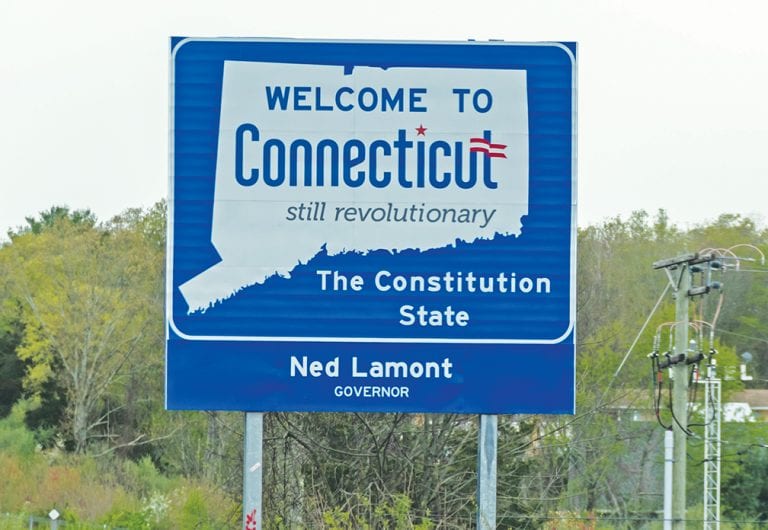HARTFORD, Conn. — Last week, both houses of the Connecticut state legislature approved a bill that would levy a highway user fee, or vehicle miles traveled tax (VMT), on large commercial trucks.
House Bill 6688, sponsored by Democratic Reps. Matthew Ritter, Martin M. Looney, Jason Rojas and Bob Duff, passed by a wide margin in both the House (88-59) on June 8, and the Senate (22-14) in the early hours of June 9.
The bill is now on the desk of the state’s Democratic Gov. Ned Lamont, who originally proposed the truck-use tax in a two-year budget presented in February 2021.
If signed into law by Lamont, HB 6688 would result in a VMT ranging from 2.5 cents per mile for commercial trucks with a gross weight of 26,000 to 28,000 pounds up to 17.5 cents per mile for those weighing 80,000 pounds or more. The fees, which would apply to all roads within the state, would be enacted Jan. 1, 2023, with motor carriers required to calculate and file monthly returns for miles traveled on roads within Connecticut. The funds generated, expected to average $90 million annually, would be deposited into a special transportation fund.
In response to outcry from members of the trucking and transportation industry against what many see as unfairly building the state’s tax base on commercial vehicle traffic, Lamont took to social media, including Twitter and Facebook, the evening of June 9, stating:
“The trucking lobby is threatening to have drivers go around Connecticut because of the Highway User Fee. That’s fine. We’ll have less air pollution, safer and better quality roads, and less people with asthma. Looks like the Highway User Fee is already working.”
Attached to the post was a video clip of Lamont making a statement to reporters, in which he noted that if trucking companies rerouted to avoid Connecticut, “We’ll still have the resources we need to make the investments we’ve got to.”
The trucking lobby is threatening to have drivers go around Connecticut because of the Highway User Fee. That’s fine. We’ll have less air pollution, safer and better quality roads, and less people with asthma. Looks like the Highway User Fee is already working. pic.twitter.com/yrVYROf0Qq
— Governor Ned Lamont (@GovNedLamont) June 10, 2021
The Owner-Operator Independent Drivers Association (OOIDA) and American Trucking Associations (ATA) both responded negatively to Lamont’s social media post via Twitter.
“Lamont’s ignorance could fill a road train of 53-foot trailers. His open hostility toward truckers is shocking. He has shown a complete lack of respect for those who keep his state running by hauling goods in & out of CT. When did politicians become so out of touch with reality?” read a June 10 post from OOIDA.
Lamont's ignorance could fill a road train of 53-foot trailers. His open hostility toward truckers is shocking. He has shown a complete lack of respect for those who keep his state running by hauling goods in & out of CT. When did politicians become so out of touch with reality? https://t.co/uz3UdSdcJL
— Owner-Operator Independent Drivers Association (@OOIDA) June 10, 2021
“While bluster may be in fashion, should store shelves start thinning out, you might regret your choice of words, unless of course you can eat them,” added Todd Spencer, president of OOIDA, in a separate tweet.
While bluster may be in fashion, should store shelves start thinning out, you might regret your choice of words, unless of course you can eat them. #truckers https://t.co/MTsHpcRYSW
— Todd Spencer (@Todd2Spencer) June 10, 2021
“Imagine being ignorant enough to think this is a clever response. You’ll also have less gasoline, less groceries, less household goods, less medicine, less construction materials… and all will cost more for consumers, too. If you bought it, a truck brought it,” ATA noted in a June 11 tweet.
Imagine being ignorant enough to think this is a clever response.
You'll also have less gasoline, less groceries, less household goods, less medicine, less construction materials… and all will cost more for consumers, too.
If you bought it, a truck brought it. #TruckTax https://t.co/9KzzPyuJ0m
— American Trucking (@TRUCKINGdotORG) June 11, 2021
Following the House passage of the bill June 8, Joe Sculley, president of the Motor Transport Association of Connecticut (MTAC), pointed out that state representatives voted to exempt dairy trucks, which he described as “the heaviest trucks on the road,” from paying the tax.
“(Dairy) trucks operate at 100,000 pounds, while the limit for all other trucks is 80,000 pounds,” Sculley stated. “This just goes to show that the truck mileage tax is not actually about damage to the roads; it’s just about money. Lighter-weight trucks will be subsidizing heavier trucks that will be exempt from the tax.”
MTAC has repeatedly voiced opposition to a truck-only fee, through letters to House and Senate leaders; written and verbal testimony to the state’s Finance, Revenue and Bonding Committee; and letters to the editor and op-ed pieces published by statewide news outlets.
“The treatment of small business trucking companies in Connecticut is like an undersized kid in grade school always getting his lunch money stolen by a bigger, stronger kid. In this case, our ‘lunch money’ is the taxes and fees the industry pays to fund the Special Transportation Fund,” Sculley wrote in an April 28 op-ed piece published on the CT News Junkie website, adding that imposing a truck mileage fee implies “it’s the trucking industry’s fault that the government has mismanaged the Special Transportation Fund.”
In addition, MTAC organized a coalition of more than a dozen businesses and trade associations representing the trucking industry, community chambers of commerce, the lumber industry, food retailers and distributors, and more, all opposing a tax levied only against commercial vehicles.
According to a June 14 newsletter from MTAC, the association, at the request of “one powerful legislator,” proposed alternatives to a truck mileage tax, including the use of COVID-19 relief funds, transferring sales tax revenue from the state’s general fund to the special transportation fund, and considering some reduction in train fare subsidies. The proposals “were seemingly ignored by the person who invited MTAC to propose the alternatives once they were submitted by MTAC,” the statement noted.
In the same newsletter the association stated, “As the legislative session was approaching its June 9 adjournment date, MTAC learned that Governor Lamont made a deal with the legislature. He would approve more state bonding in order to send money to towns and cities, if the legislature approved the truck mileage tax. Something like that is hard to fight against.”
Sculley said he believes the tax is ultimately destined to fail.
“Proponents (of the tax) think that all they have to do is compare miles reported under the interstate agreement known as IFTA (International Fuel Tax Agreement) against miles reported under this new mileage tax,” he explained.
“They don’t realize that (1), out-of-state trucking companies report their IFTA miles to their base state, and that Connecticut does not have access to those records, and (2), IFTA includes single-unit trucks, which this tax does not. Connecticut cannot do an apples-to-oranges comparison for purposes of enforcing this new tax,” Sculley continued.
“Connecticut is never going to see the money predicted for this bill, and this tax scheme will fail,” he concluded.









Lamont is an IDIOT
The cost of moving freight into and out of Connecticut will go up exponentially. Causing Connecticut shippers and receivers to ultimately pay the tax! Trucking companies will just charge more for moving Connecticut’s freight!!!